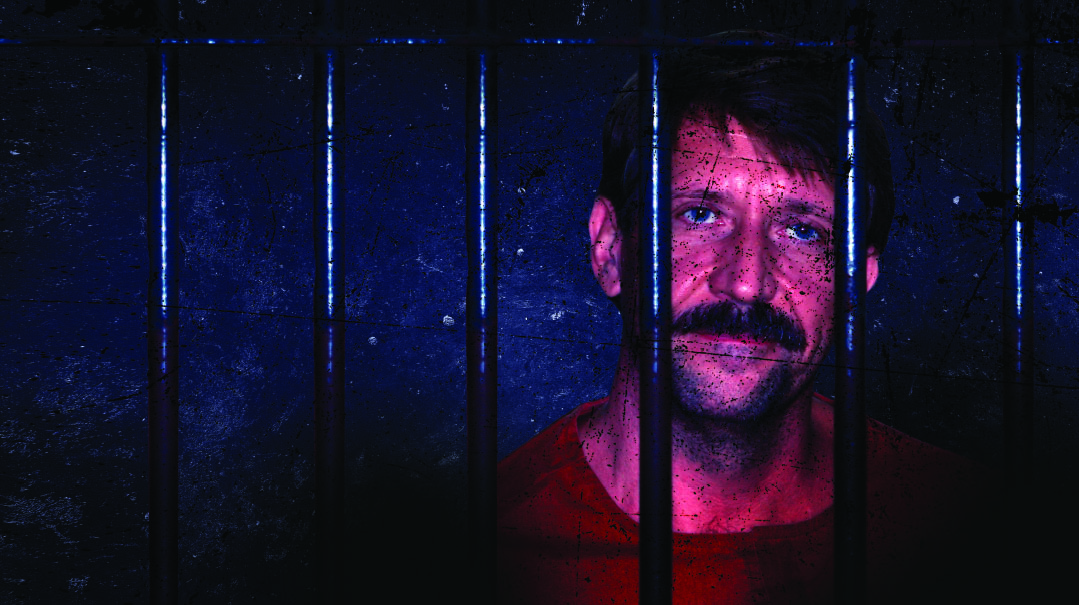Safer Behind Bars

A Russian arms dealer stays quiet in a US prison

Photos: AP Images
President Joe Biden and his Russian counterpart Vladimir Putin had a lot to talk about in their three-hour meeting last month in Switzerland. They chatted about the capitalistic rights of Russian hackers to demand ransoms from American infrastructure companies; they spoke about Russia’s security needs and why that requires the country to invade half of Ukraine; they discussed the future of Alexei Navalny, who somehow found himself in a Siberian prison for the next two lifetimes. Even polar bears somehow made it into the conversation, when Putin raised the issue of control over quarries concealed beneath the arctic ice sheet. It was interesting.
But Putin saved his best shot for the last.
“What do you think,” he casually asked the American president toward the end of the summit, “about doing a prisoner exchange, you and I?”
“Do you have someone specific in mind?” Biden asked, equally casually.
Putin shrugged and glanced at a note that one of his aides had stuck into his hand before he entered the room.
“I have two names here,” he said in his most indifferent KGB-honed tone. “One is Konstantin Yaroshenko [a Russian pilot found guilty of conspiracy to bring drugs into the United States], and… another one. Someone named Viktor Bout… not particularly important but my aides tell me it’s better that he should be in Moscow and not in a federal prison in Marion.”
“That may be true,” Biden agreed. “But… my aides claim that it’s actually better for Bout to stay right where he is, unless you have a convincing reason for us to transfer him to you.”
Viktor Bout, a Russian arms dealer dubbed “The Merchant of Death” for his vast arms trafficking activities, allegedly used his multiple air transport companies to smuggle weapons from Eastern Europe to Africa and the Middle East during the 1990s and early 2000s, after the collapse of Communism. A former Soviet air force officer who saw the potential for selling weapons internationally as the Cold War came to an end, Bout allegedly had extensive dealings with the Taliban in Afghanistan and armed several other terrorist groups. Bout, who allegedly supplied weapons to anyone who would pay him, was arrested in 2008 in Thailand on terrorism charges by the Royal Thai Police in cooperation with American authorities, accused of intending to smuggle arms to revolutionaries in Colombia for use against US forces there. He was extradited to the US, convicted of conspiracy to kill US citizens and officials and providing aid to a terrorist organization, and was sentenced to 25 years’ imprisonment. Since June 2012, Bout has been held at the United States Penitentiary, Marion, Illinois.
Even if Putin had read the Russian edition of Donald Trump’s Art of the Deal, he knows that he doesn’t really have what to offer the Americans in exchange for Bout. If Putin wants Bout’s freedom — or at least to transfer him to Moscow — he will have to pay for it with strategic assets. And Putin, for reasons understood by every Russian diplomat, is loath to doing that. And so, another opportunity to release him went up in a puff of smoke.
It wasn’t the first time that Russia had asked for Bout. The Russians are concerned that Bout, with his vast insider’s knowledge of the murky intersection of Russian intelligence, global criminal networks, and international weapons sales, will spill the beans in exchange for not spending the rest of his life in federal prison. In fact, there is no diplomatic channel in the last 12 years that hasn’t been activated for his release. Former President Trump even received a request for a presidential pardon. But all those requests were met with a firm American “nyet.”
The Russians, understandably, are nervous. With every passing year, Bout may decide that it’s preferable for him to just divulge what he knows. And if Bout opens his mouth, a number of senior Russian officials — perhaps even Putin himself — may find themselves in a most unpleasant position.
Meanwhile, Bout is keeping quiet, primarily in light of the fear that one day, the Americans will actually accede to Russian pressure — perhaps in exchange for the release of Alexei Navalny, for example — and will return him to his homeland. Once there, he’ll need to prove that he did not reveal any state secrets. And in the Lubyanka Prison, they don’t exactly treat traitors with silk gloves.
Seasoned dealer that he is, Bout understands that for now, his silence promises him the best possible deal as far as he is concerned: no freedom, but also no death.
Oops! We could not locate your form.







